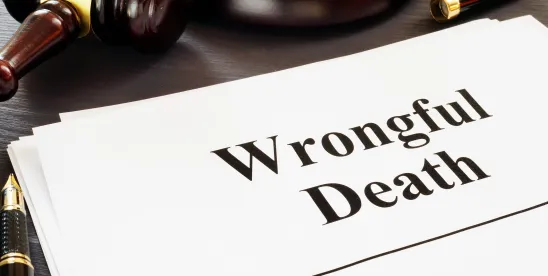In the blink of an eye, a bad car wreck or another serious incident can result in a death. Losing a loved one is absolutely devastating. In North Carolina, when an individual's negligence, wrongful acts, or intentional acts cause the death of another, a wrongful death claim may arise. Navigating a wrongful death claim can be overwhelming. A wrongful death lawyer can help you through the process, and you can focus on grieving and recovering from your loss.
What Is a Wrongful Death Claim?
As explained above, wrongful death claims arise when someone dies as a result of another individual's negligence, wrongful acts, or intentional acts. If the deceased individual would have been entitled to bring a personal injury lawsuit against the at-fault party had the deceased individual survived, the personal representative of the deceased individual's estate may bring a wrongful death claim. A personal representative may be named in a deceased individual's estate planning documents or a surviving family member. The court will appoint a personal representative, who will then have the power to represent the deceased individual's interests.
Wrongful death claims can arise in all types of personal injury matters, including, for example:
- Car wrecks
- Trucking or 18-wheeler wrecks
- Boating accidents
- Nursing home abuse, neglect, or incidents
- Premises liability incidents
- Medical malpractice
- Intentional acts of violence (such as a shooting)
Wrongful death actions are civil actions, not criminal actions.
The Intricacies of a Wrongful Death Claim
A wrongful death claim can become complicated quite quickly. In this section, we list some common issues that arise with these claims.
Statute of Limitations
In North Carolina, wrongful death claims must be filed within two years from the date of death. If a personal representative fails to bring the lawsuit within two years of the date of death, the cause of action and any potential recovery is typically barred. Therefore, it is imperative that you consult with an attorney to navigate these time restrictions.
Wrongful Death Damages
Under North Carolina law, survivors may receive compensation for the following damages in a wrongful death claim:
- The decedent's medical expenses associated with the injury resulting in death;
- The decedent's reasonable funeral expenses;
- The decedent's pain and suffering;
- The monetary value of the loss of the decedent's future net income;
- The monetary value of the loss of the services, protection, care, and assistance the decedent would have provided; and,
- The monetary value of the loss of the decedent's society, companionship, comfort, guidance, kindly offices, and advice.
In some circumstances, punitive damages may be available. Punitive damages are designed to punish the responsible party and to deter future similar conduct. If the conduct or circumstances leading to the decedent's death were egregious (the death was caused by malicious, willful, or wanton conduct), punitive damages may be appropriate.
Proceeds from Wrongful Death Claims
When the deceased individual's estate receives proceeds from a wrongful death settlement or jury verdict, what happens next? The personal representative is responsible for distributing the proceeds in accordance with North Carolina law. Even if the deceased individual has a last will and testament or other estate planning in place, North Carolina law controls the disbursement of proceeds, not the estate planning documents.
Under North Carolina law, wrongful death proceeds pass via North Carolina's intestate succession laws. This analysis can become complicated, particularly where the deceased individual has numerous family members surviving, such as a spouse and kids. Some family members may not be entitled to receive any of the proceeds under the law. Further, different family members may be entitled to varied shares (the split is not always equal amongst everyone). Therefore, a wrongful death lawyer is crucial to help the personal representative determine who is entitled to receive a share of any wrongful death proceeds recovered in a claim.
Potential Legal Defenses
As with all personal injury claims in North Carolina, the at-fault party may raise a number of defenses in a wrongful death lawsuit. For example, North Carolina is one of only a few states that still recognizes "contributory negligence." Under this doctrine, if the deceased individual negligently contributed to the incident in the slightest manner—even just by 1%—the deceased's family may be barred from bringing the wrongful death action. If an at-fault party raises the defense of contributory negligence, there are exceptions, including the "last clear chance" doctrine and "gross negligence." Collecting facts and evidence to support these exceptions is crucial. Thus, it is important to speak with a skilled attorney as soon as possible if you feel you may have a potential wrongful death claim.
Conclusion
Losing a loved one is heartbreaking. Handling a wrongful death claim without assistance can be overwhelming and difficult. Ward and Smith's wrongful death lawyers take a team approach to helping clients, giving clients top-tier representation and accessibility to communicating with lawyers.
ND:4861-9898-6680, v. 2





 />i
/>i

